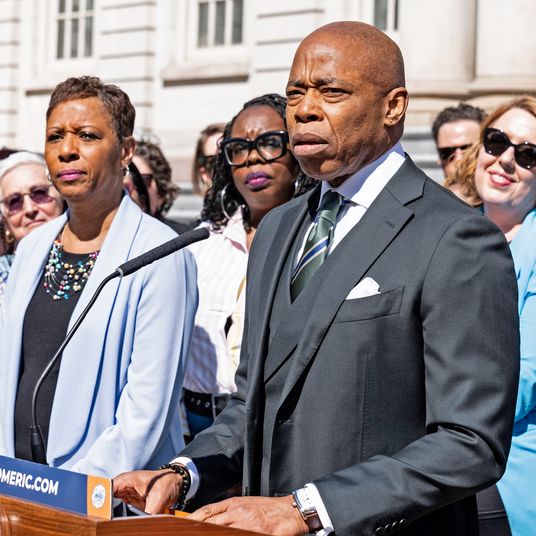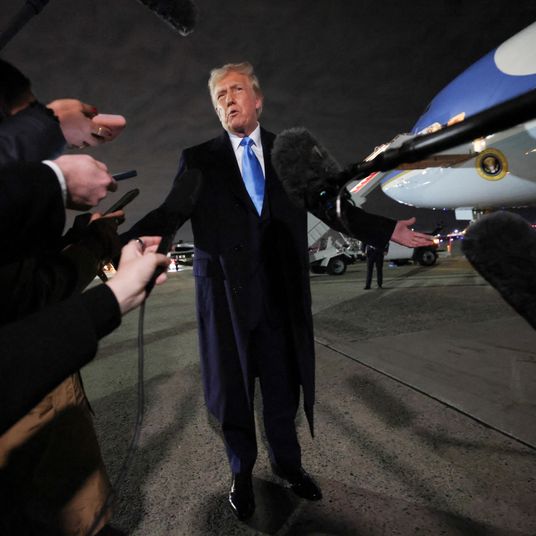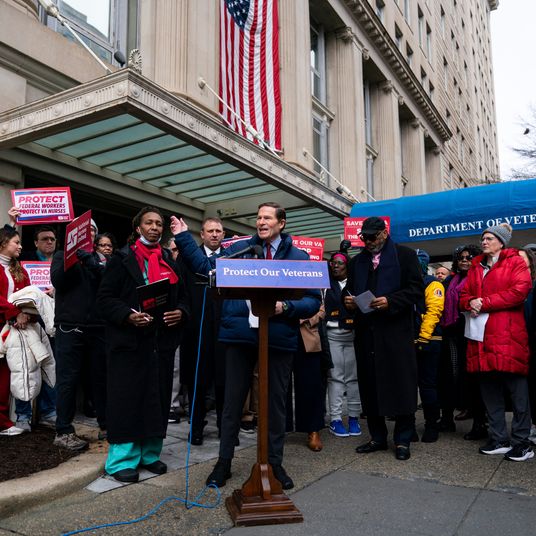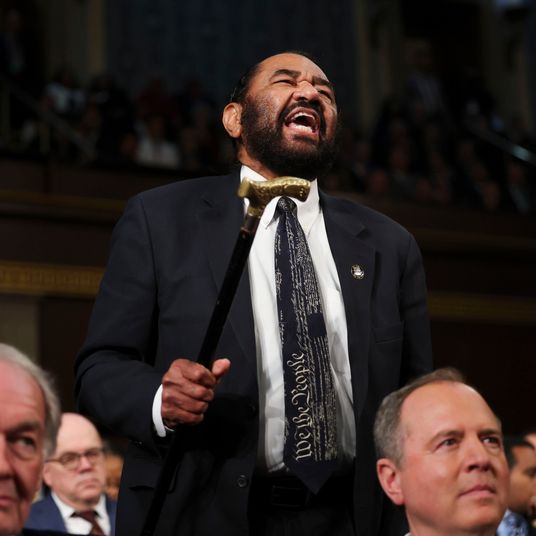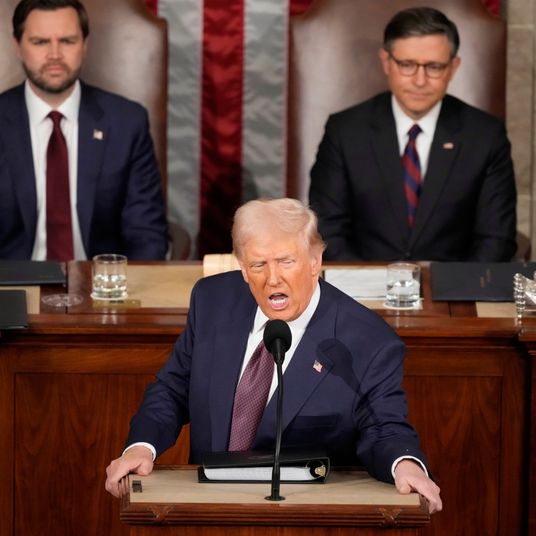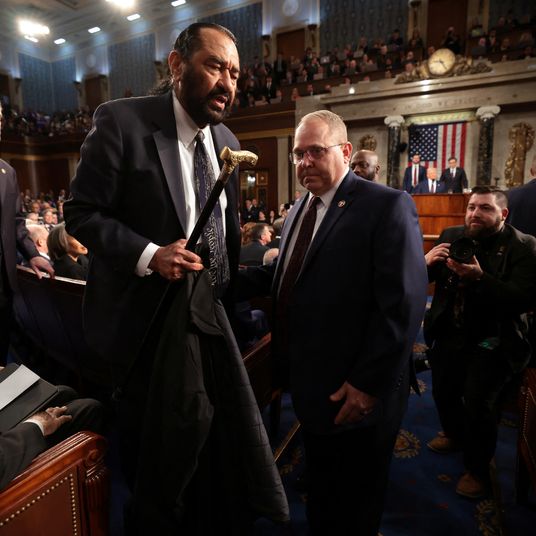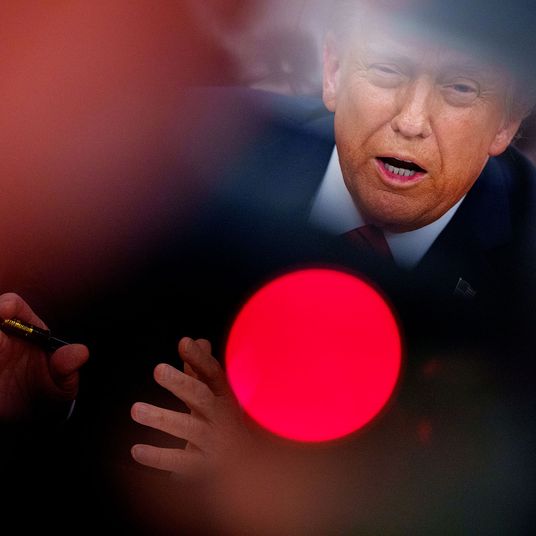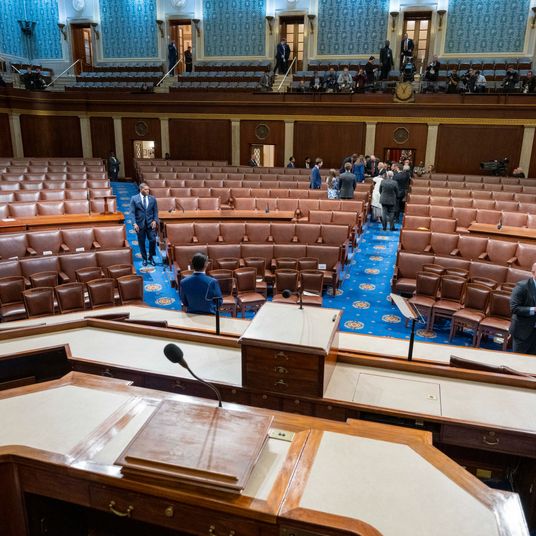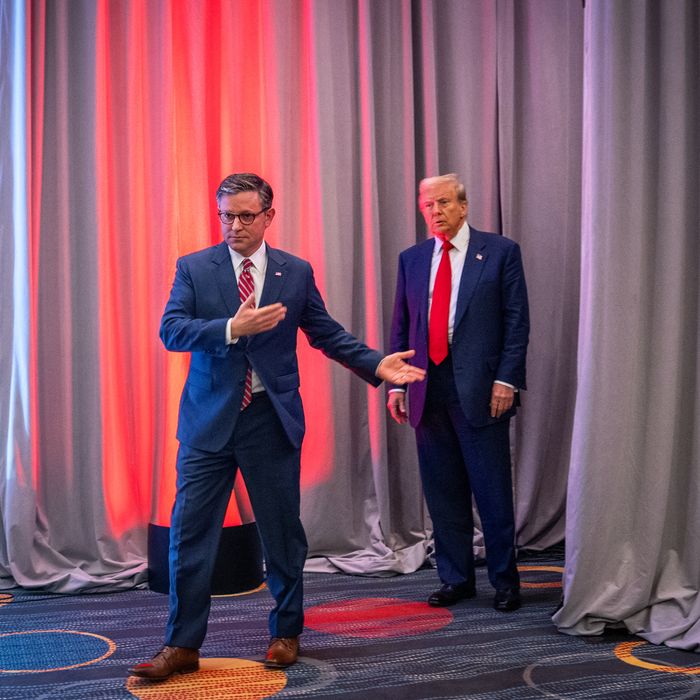
Mike Johnson is Speaker of the House. For now.
After a handful of hard-right Republicans held out on Friday, he was reelected, winning them over not with his own personal charm but with the muscle of Donald Trump. The day began with the formulaic roll call of every member of the House, which had become familiar to a national audience over the 19 different ballots to elect a Republican Speaker in 2023. (First, the 15 needed to elect Kevin McCarthy and then the four needed to replace him after his ouster.) It all started as placidly as one could expect, with Democrats supporting Hakeem Jeffries and Republicans voting for Johnson. The roll call rumbled along until it reached Andy Biggs.
A Freedom Caucus member who was one of the eight to oust McCarthy, he stood in the back of the chamber and did not respond when called. The clerk moved on to Sheri Biggs, a newly elected Republican from South Carolina, who announced her vote for “President Trump’s endorsed candidate Mike Johnson.” There were scattered cheers on the Republican side of the aisle, while a Democrat audibly mumbled, “Oh God.” Five other Republicans joined Andy Biggs in not casting a ballot: Andrew Clyde of Georgia, Michael Cloud of Texas, Paul Gosar of Arizona, Andy Harris of Maryland, and Chip Roy of Texas. Johnson could afford to lose only one vote.
Three Republicans voted for other candidates: Ralph Norman of South Carolina, Keith Self of Texas, and Thomas Massie of Kentucky, a libertarian gadfly who was considered unmovable. In a television interview the night before with his former colleague Matt Gaetz, he went so far as to say, “You can pull all my fingernails out, you can shove bamboo up in them, you can start cutting off my fingers. I am not voting for Mike Johnson tomorrow, and you can take that to the bank.”
The rebels were all hard-line conservatives who want drastic reductions in spending and limitations on the power of the Speaker. They have long been skeptical of Republican leaders for their willingness to make deals with Democrats to fund the government and avoid defaulting on the nation’s debt. They had registered their objections to Johnson only weeks before when they torpedoed an effort to avoid a government shutdown. And they were making clear their willingness to continue to make life difficult for the Speaker moving forward. The abstainers all eventually cast their votes for Johnson, but he was still two votes shy and the House was in limbo. The vote seemed over, but it had yet to be gaveled to a close.
Members were milling about, gossiping and trying to figure out what was next, leaving the chamber frozen in suspense. Johnson and his allies were working the dissidents on the floor when, suddenly, he began to lead the group around the chamber, looking for a place to meet. It was as if he were the Pied Piper of the Freedom Caucus as a long line of roughly ten members snaked around the back of the House following him. Eventually, they huddled behind closed doors in a room where Trump was on the phone. After about 15 minutes, Norman and Self came back out and, joined by Johnson, stood before the dais as members turned their attention to the front of the chamber. They had changed their votes to support Johnson after Trump’s intervention. Republicans applauded as Johnson finally won.
The question for Johnson is whether his procession around the House chamber will be the last time he clearly leads as speaker, given the impetus to get him elected came from Trump. Freshman Brian Jack of Georgia, a longtime Trump aide, thought the electoral mandate Trump received in November was “very much a motivating factor for us to get organized, get operative as quickly as possible.”
That factor won’t exist again. Trump needs his election certified only once, something that couldn’t be done until there was a Speaker. Trump will have only one honeymoon period immediately after taking office that he can use to pass a legislative program, and a prolonged leadership fight would have been a major obstacle. The support Johnson received to win the gavel was not an endorsement of the Speaker; it was an endorsement of Trump — he holds office only as long as it is in Trump’s interest. Without his aid to woo dissidents, Johnson will not have the necessary support to survive a challenge to his speakership.
He does have some advantages, having changed the rules so that instead of a single member being able to oust a Speaker, it will now take nine. However, precisely nine Republicans did not support him at any point on Friday. Johnson also benefits from a more pliant conference than he had in the previous Congress. Of the eight members who pushed to oust McCarthy, four have already left. In contrast, all of the newly elected freshman Republicans voted for Johnson, something Representative Jack pointed out. “I’m incredibly proud that not one freshman voted against him or even withheld their vote for any period of time,” he said.
However, with no margin for error, it doesn’t matter that Johnson has slightly fewer problem children than before. Provided that Democrats stick together, all it will take is two Republican dissenters to thwart anything Johnson does. And this could be beyond even Trump’s control: Two of the most skeptical Republicans, Massie and Roy, endorsed Ron DeSantis for president and both voted against a government-funding deal in December despite Trump’s going on social media to threaten them with primary challenges.
It’s not a recipe for long-term stability or long-term success. It was tough to find Republicans who were confident that Johnson won’t face future challenges. When asked if he thought Johnson might face an effort to oust him over the next two years, Representative Tim Burchett, who supported the one to oust McCarthy, was sanguine: “We could, but again, it’s democracy and that’s how it’s supposed to work.”









